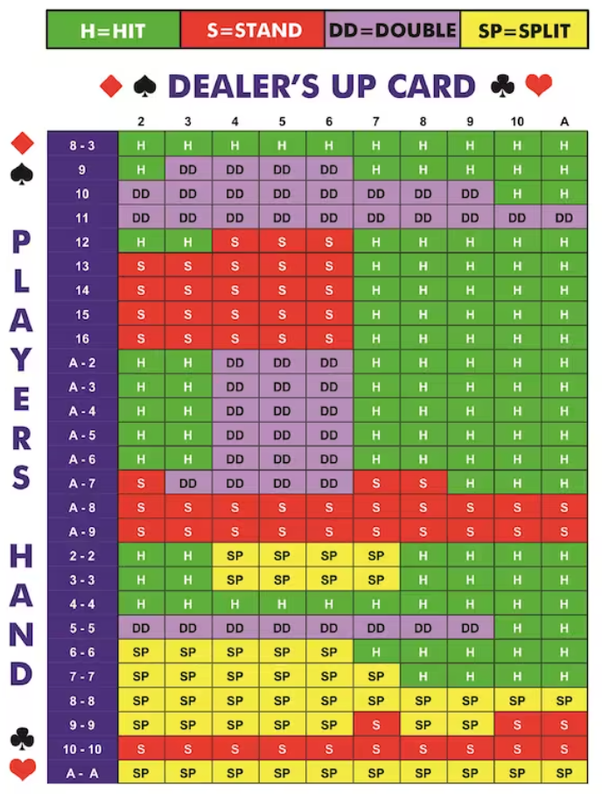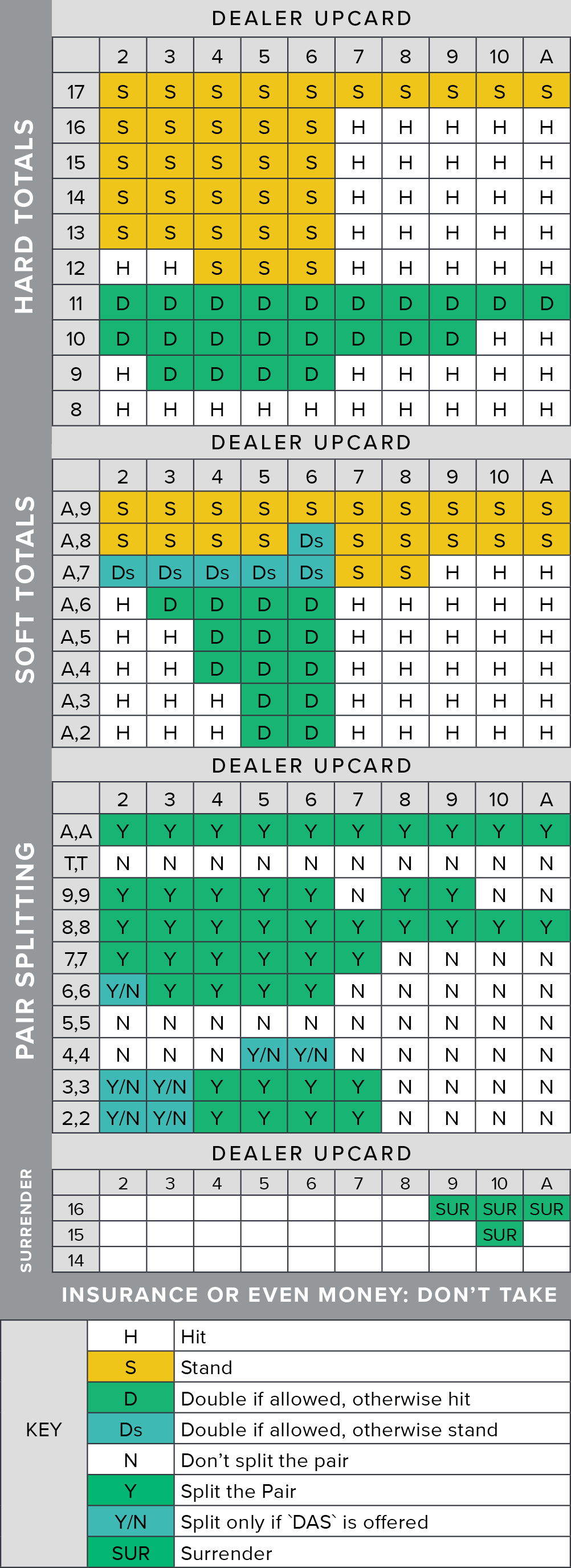Should you hit on 15

When playing blackjack, knowing when to hit is a key strategy. Generally speaking, if your hand's total is 11 or lower, you should always hit in order to. And if you draw any of the four ten-valued cards, you do no harm to the hand. Bottom line: Your best strategy is to always hit A-7 when the. If your hand totals 17, 18, 19 or 20, then you should stand, no matter what should you hit on 15 you have a pretty good chance of going bust as your next card is. A, hit on 15 vs. A, stand on 17 vs. A, stand on A But in a single deck game, players should hit if their 12 consists of a 10 and a 2. As a result, casinos.
16 vs 10 and 15 vs 10 (surrender, stand, or hit)
Do I hit 16 vs 10? Under the same conditions, hitting on a hard 16 against a 9, 10 or ace will lose about 74 percent of the time. In other words, playing a hard 16 results in a loss about 75 percent of the time - proof that we zealots are correct when we say that it doesn't really matter if you hit or stand.
Should you always hit on 15 in blackjack? Question: “When should I hit on my 15?” Sam says: “Always hit a hard 15 when the dealer's up-card is a 7 through an ace. If you stand on that 15, you will win 25.36 percent of the time and lose 74.64 percent of the time.
Should I hit on 15 in black jack? 17 and up always stands. 16 stands against dealer 2 through 6, otherwise hit. 15 stands against dealer 2 through 6, otherwise hit. 14 stands against dealer 2 through 6, otherwise hit.
Do you hit on 15 when dealer has 10? In a double- or multi-deck game, if your 15 consists of an 8-7, hit against a dealer 10 upcard (rather than surrender). In all games, if your 16 is multi-card or the result of a pair split, stand against a dealer's 10 upcard instead of hit.
Should you hit on a 15 blackjack? 15 stands against dealer 2 through 6, otherwise hit. 14 stands against dealer 2 through 6, otherwise hit. 13 stands against dealer 2 through 6, otherwise hit. 12 stands against dealer 4 through 6, otherwise hit.
Do you hit on soft 16? Patterns are different when the dealer shows 2 through 6. Then those with soft 16 will want hit vs. 2 and 3 and double down vs. 4, 5 or 6.
Is 15 good in blackjack? Question: “When should I hit on my 15?” Sam says: “Always hit a hard 15 when the dealer's up-card is a 7 through an ace. If you stand on that 15, you will win 25.36 percent of the time and lose 74.64 percent of the time. That makes a net loss of 49.28 percent.
How Far Should You Hit Each Golf Club?
Do you hit or surrender. According to the basic strategy, surrender 15 against If you're counting, then stand on 15 against 10 if the true count is 4 or higher. What do you do if the true count is less than 4. Also, according to the "Fab 4", surrender 15 against 10 on positive count. Both Standford Wong and John Bukofsky wrote that the only three strategy deviations worth practicing are 1 insurance, 2 16 vs 10, and 3 15 vs 10, which are the first three of the Illustrious After those three, the benefits of other strategy deviations are so small that they're negligible.
BJQueen Member Oct 9, Thanks for replying, but you seem to have missed my question. The presence of a 10 in the player's hand has two consequences: [17]. Even when basic and composition-dependent strategies lead to different actions, the difference in expected reward is small, and it becomes smaller with more decks.
Using a composition-dependent strategy rather than a basic strategy in a single-deck game reduces the house edge by 4 in 10,, which falls to 3 in , for a six-deck game. Blackjack has been a high-profile target for advantage players since the s. Advantage play attempts to win more using skills such as memory, computation, and observation.
While these techniques are legal, they can give players a mathematical edge in the game, making advantage players unwanted customers for casinos. Advantage play can lead to ejection or blacklisting. Some advantageous play techniques in blackjack include:. During the course of a blackjack shoe, the dealer exposes the dealt cards.
Players can infer from their accounting of the exposed cards which cards remain. These inferences can be used in the following ways:. A card counting system assigns a point score to each card rank e. When a card is exposed, a counter adds the score of that card to a running total, the 'count'. Should you hit on 15 A card counter uses this count to make betting and playing decisions.
The count starts at 0 for a freshly shuffled deck for "balanced" counting systems. Unbalanced counts are often started at a value that depends on the number of decks used in the game. Blackjack's house edge is usually around 0. Card counting works best when a few cards remain.
This makes single-deck games better for counters. As a result, casinos are more likely to insist that players do not reveal their cards to one another in single-deck games. In games with more decks, casinos limit penetration by ending the shoe and reshuffling when one or more decks remain undealt.
Casinos also sometimes use a shuffling machine to reintroduce the cards whenever a deck has been played. Sometimes a casino might ban a card counter from the property. The use of external devices to help count cards is illegal throughout the United States. Another advantage play technique, mainly applicable in multi-deck games, involves tracking groups of cards also known as slugs, clumps, or packs through the shuffle and then playing and betting according to when those cards come into play from a new shoe.
Shuffle tracking requires excellent eyesight and powers of visual estimation but is harder to detect; shuffle trackers' actions are largely unrelated to the composition of the cards in the shoe. Arnold Snyder's articles in Blackjack Forum magazine brought shuffle tracking to the general public.  His book, The Shuffle Tracker's Cookbook , mathematically analyzed the player edge available from shuffle tracking based on the actual size of the tracked slug.
His book, The Shuffle Tracker's Cookbook , mathematically analyzed the player edge available from shuffle tracking based on the actual size of the tracked slug.
Jerry L. Patterson also developed and published a shuffle-tracking method for tracking favorable clumps of cards and cutting them into play and tracking unfavorable clumps of cards and cutting them out of play. The player can also gain an advantage by identifying cards from distinctive wear markings on their backs, or by hole carding observing during the dealing process the front of a card dealt face-down.
These methods are generally legal although their status in particular jurisdictions may vary. Many blackjack tables offer side bets on various outcomes including: [28]. The side wager is typically placed in a designated area next to the box for the main wager. A player wishing to wager on a side bet usually must place a wager on blackjack.
Some games require that the blackjack wager should equal or exceed any side bet wager. A non-controlling player of a blackjack hand is usually permitted to place a side bet regardless of whether the controlling player does so. The house edge for side bets is generally higher than for the blackjack game itself. Nonetheless, side bets can be susceptible to card counting.
A side count designed specifically for a particular side bet can improve the player's edge. Only a few side bets, like "Insurance" and "Lucky Ladies", correlate well with the high-low counting system and offer a sufficient win rate to justify the effort of advantage play. In team play, it is common for team members to be dedicated to only counting a side bet using a specialized count.
Some casinos, as well as general betting outlets, provide blackjack among a selection of casino-style games at electronic consoles. Video blackjack game rules are generally more favorable to the house; e. Video and online blackjack games generally deal each round from a fresh shoe i. Blackjack is a member of the family of traditional card games played recreationally worldwide.
Most of these games have not been adapted for casino play. Furthermore, the casino game development industry actively produces blackjack variants, most of which are ultimately not adopted by casinos. The following are the most prominent and established variants in casinos. Examples of local traditional and recreational related games include French vingt-et-un 'twenty-one' and German Siebzehn und Vier 'seventeen and four'.
Neither game allows splitting. An ace counts only eleven, but two aces count as a blackjack. It is mostly played in private circles and barracks. The popular British member of the vingt-un family is called "pontoon", the name being probably a corruption of vingt-et-un.
In , professional gamblers worldwide were invited to nominate great blackjack players for admission into the Blackjack Hall of Fame. Seven members were inducted in , with new people inducted every year after. Members include Edward O. Thorp , author of the s book Beat the Dealer ; Ken Uston , who popularized the concept of team play; Arnold Snyder , author and editor of the Blackjack Forum trade journal; and Stanford Wong , author and popularizer of "Wonging".
Contents move to sidebar hide. Article Talk. Read Edit View history. Tools Tools. Download as PDF Printable version. Best ufc picks In other projects. Wikimedia Commons Wikibooks. Gambling card game. This article is about the gambling game. For other uses, see Black Jack. This section relies largely or entirely on a single source.
Relevant discussion may be found on the talk page. Please help improve this article by introducing citations to additional sources. Blackjack example game. Main article: Advantage player. Main article: Card counting. Main article: Shuffle tracking. This section does not cite any sources. Please help improve this section by adding citations to reliable sources.
Unsourced material may be challenged and removed. June Learn how and when to remove this template message. Main article: Blackjack Hall of Fame. Scarne's new complete guide to gambling Fully rev. ISBN The Oxford guide to card games. Oxford [England]. OCLC Barcelona: Flor del Viento Ediciones.
Journal of the American Statistical Association. JSTOR Retrieved May 21, Las Vegas Sun. Should you hit on 15 You can also test your skills on the wider range of games available at UK Casinos. Also available are free blackjack promo codes. The Dealer's Upturned card. Dealer's chance of going bust!
There's a reasonable chance the dealer will go bust, and he will be lucky if he finishes in the zone. If you've got 13 or more then stand. Hit on 12 or less. This is bad for the dealer. Don't risk going bust. Hit on 11 or less. The dealer is likely to get a high score, so you have to take more of a chance. Hit on 16 or less. As it's likely you'll be beaten it's worth being brave.
Hit on 17 or less. Suppose you're holding an ACE and a 3, this is called a soft If you hit and get 7, you've got a perfectly valid 21, but if you hit and get 8, then your ACE is worth 1, and your total becomes You're still in the game. Having an ACE is a very powerful weapon against the dealer providing you know how best to use it.